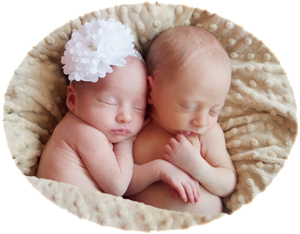Often, multiples are born small and early. They may be initially cared for in a special care nursery called the neonatal intensive care unit (NICU).
In the NICU
 The NICU combines advanced technology and trained health care professionals to provide specialized care for the tiniest patients. NICUs may also have intermediate or continuing care areas for babies who are not as sick but do need specialized nursing care. Beaumont has dedicated NICUs at both the Royal Oak and Troy hospitals.
The NICU combines advanced technology and trained health care professionals to provide specialized care for the tiniest patients. NICUs may also have intermediate or continuing care areas for babies who are not as sick but do need specialized nursing care. Beaumont has dedicated NICUs at both the Royal Oak and Troy hospitals.
In most cases, you can be with your babies in the NICU at any time. The staff of the NICU will give you instructions on special hand washing techniques before entering the area. In some cases, you may need to wear a mask. Occasionally, during a procedure, or when the hospital staff are making "rounds," parents may be asked to wait for a few minutes before coming into the area. Although most NICUs permit visitation of babies by other family members, limiting visitors is a good idea. Many sick and premature babies are very susceptible to infection. Siblings should be carefully checked for signs of colds or other illness and be helped with hand washing before visiting their baby brother or sister.
Most parents find that becoming involved with their babies' care gives them a sense of control and helps them bond with their babies. This is also important for the babies, helping the babies feel secure and loved. Once the babies' condition is stable, parents are encouraged to hold and rock them. Staff in the NICU can show you how to care for your babies in many ways. Learning these aspects of care is helpful in preparing you to take your babies home.
Once your babies are able to feed, grow, and stay warm, they can usually be discharged. Other babies who are healthy at birth may need only a brief check in a special care nursery.
Breastfeeding multiple birth babies
Breastfeeding multiples is certainly possible, and encouraged. Many mothers of twins and even triplets are successful in exclusive breastfeeding all of their babies. Nature designed human milk especially for human babies, and it is the ideal food for your babies' first several months. Your breast milk contains just the right balance of nutrients, and it contains them in the form that is most easily used by the human baby's immature body systems. Because it was developed for your babies, your milk also is gentle on your babies' systems. Breast milk is rich in the nutrients that promote brain growth and nervous system development. It is the perfect first food to help your babies achieve every aspect of ideal growth and development.
You may have to overcome difficulties that a mother and her full-term, healthy baby are unlikely to run into when learning to breastfeed. You and your babies can still learn to breastfeed, though it may take a bit more patience and persistence. How soon you and your babies can begin to breastfeed will depend on the maturity of your babies' brains and body systems. Although a baby's gestational age influences the development of stable body systems and reflexes needed for oral feedings, a baby's physical condition may also affect when direct breastfeeding can begin.
Lactation specialists can help mothers of multiples learn techniques for breastfeeding their babies both separately and together. They can also help mothers learn techniques to increase milk supply. Mothers whose babies are unable to breastfeed because they are sick or premature can pump their breast milk and store the milk for later feedings.
Families with more than one baby need help from family and friends. The first two months are usually the most difficult as everyone learns to cope with frequent feedings, lack of sleep, and little personal time. Having help for household chores and daily tasks can allow the mother the time she needs to get to know her babies, for feedings, and for rest and recovery from delivery.
Thank you to Bella Baby Photography for capturing and sharing these Beaumont baby photos. All photographs are supervised and may not be considered safe sleep environments.